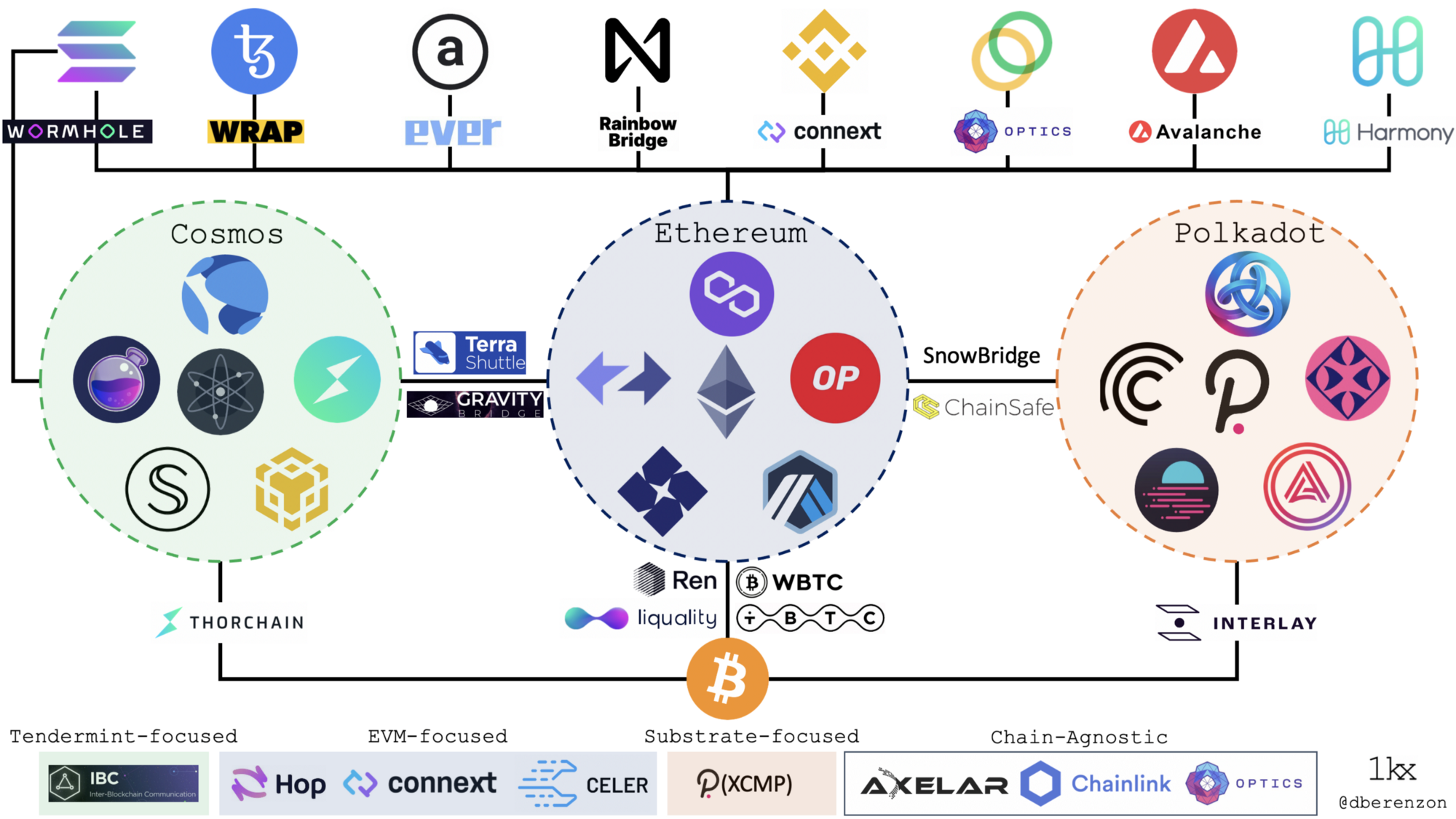Study Shows Cross-Chain Bridge Technology Growth, Bridges to Ethereum Exceed $7 Billion
Publikováno: 16.9.2021
 On September 8, 2021, Dmitriy Berenzon, research partner at 1kxnetwork, an early-stage crypto fund that helps founders bootstrap token networks, published a comprehensive research post concerning blockchain bridges. Berenzon’s study highlights the current “multi-chain market structure” and bridges that are making a myriad of blockchains compatible. Researcher: ‘We Are Finally in a Multi-Chain Market Structure’ […]
On September 8, 2021, Dmitriy Berenzon, research partner at 1kxnetwork, an early-stage crypto fund that helps founders bootstrap token networks, published a comprehensive research post concerning blockchain bridges. Berenzon’s study highlights the current “multi-chain market structure” and bridges that are making a myriad of blockchains compatible. Researcher: ‘We Are Finally in a Multi-Chain Market Structure’ […]

On September 8, 2021, Dmitriy Berenzon, research partner at 1kxnetwork, an early-stage crypto fund that helps founders bootstrap token networks, published a comprehensive research post concerning blockchain bridges. Berenzon’s study highlights the current “multi-chain market structure” and bridges that are making a myriad of blockchains compatible.
Researcher: ‘We Are Finally in a Multi-Chain Market Structure’
For quite some time now, multi-chain or cross-chain technology has been a holy grail of sorts in the cryptocurrency development space. People want to transact with other blockchains by leveraging bridges to different ecosystems.
Dmitriy Berenzon published a detailed article about the subject of cross-chain tech and bridges, and he believes we’ve finally reached a watershed moment. “After years of research & development, we are finally in a multi-chain market structure,” Berenzon stresses in his blog post.

Berenzon’s study looks at blockchains like Ethereum, Solana, Tezos, Avalanche, Polkadot, Binance Smart Chain, Cosmos, and more. The researcher notes that “interoperability unlocks innovation” as he highlights that “bridges are important because they enable users to access new platforms, protocols to interoperate with each other, and developers to collaborate on building new products.”
Moreover, Berenzon lists the many benefits of cross-chain interoperability like leveraging the tech for external validators and federations. Also, using the tech for light clients and relay protocols alongside the ability to access liquidity networks.
However, Berenzon’s report is not just a fluff piece about fintech, and he highlights that cross-chain tech and bridges are an “incredibly difficult problem in distributed systems.” He adds that things like finality and rollbacks need to be addressed, NFT transfers and provenance, alongside stress testing these blockchain bridges over time.
$7.7 Billion Locked Across 8 Bridges to Ethereum
In addition to Berenzon’s insights, statistics from Dune Analytics’ dashboard called “Bridge Away” measure bridge volume tethered to the various chains and Ethereum. In terms of Ethereum bridge relative total value locked (TVL) stats, the Polygon ERC20 Bridge has approximately $2.4 billion in TVL on September 16, 2021.

Polygon’s bridge represents 32.5% of the TVL across eight bridges. The bridges recorded include the Polygon ERC20 Bridge, Arbitrum Bridges, Avalanche Bridge, Solana Wormhole, Fantom Anyswap Bridge, Harmony Bridges, Optimism ERC20 Bridges, and Near Rainbow Bridge.
Across all of these bridges mentioned, there’s $7.79 billion TVL spread across 42,997 unique addresses during the last 30 days. Arbitrum Bridges command 31.5% of the aggregate TVL and the Avalanche Bridge has around 21.2% today.
Solana Wormhole’s TVL is about 6.7% and the Fantom Anyswap Bridge has around 6.6% of the $7.79 billion TVL. Ether and WETH are the top assets held in TVL with $2.9 billion recorded on September 16. USDC is the second leading asset held in bridge TVL with $1.2 billion recorded. This is followed by wrapped bitcoin (WBTC) which has just over a billion dollars held in the overall bridge TVL aggregate total.
What do you think about multi-chain or cross-chain bridge technology and the expanding TVL held by these protocols? Let us know what you think about this subject in the comments section below.